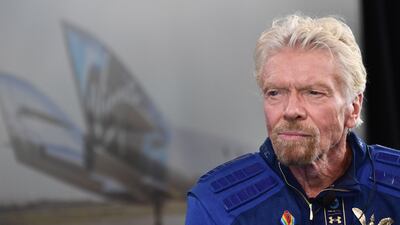British billionaire Richard Branson hit out at cryptocurrency swindlers and said he is stepping up efforts to stop his name from being used to convince unsuspecting victims to sign up to fraudulent schemes.
“It is a terrible thing because it affects a small person who can ill afford it,” Mr Branson said during an interview in Austin, Texas. “We are doing enormous amounts to try to stop it.”
The Virgin Group founder said he has spoken with Meta Platforms’s outgoing chief operating officer Sheryl Sandberg about erroneous promotions appearing on Facebook, and directed lawyers to confront other social media players whose platforms have hosted fake advertising.
Mr Branson is in Austin during a promotional visit after his Virgin Atlantic Airways launched flights there. The city was also hosting CoinDesk’s Consensus conference, one of the cryptocurrency industry’s largest annual meetings.
In the UK, Mr Branson has joined with business figures including Martin Lewis, founder of consumer website MoneySavingExpert.com, to persuade the government to include paid-for fraudulent advertisements in the new Online Safety Bill, which will make technology companies responsible for user-generated cons.
Legislation including the amendment was published in March and is proceeding through Parliament.
Mr Branson’s name may be particularly open to exploitation because he has backed Bitcoin as a sensible investment. A report last year from the UK’s National Cyber Security Centre listed him as among celebrities whose names are most often used by cryptocurrency fraudsters.
The fraud typically features fake online newspaper reports in which people appear to endorse cryptocurrency schemes that readers can gain access to via links in the articles.
Money is extracted from the unwary in a variety of ways, including so-called advance fee rackets seeking upfront payments.
Despite the rout in cryptocurrencies, Mr Branson said he continues to recommend Bitcoin purchases via legitimate avenues as long as individuals are not overexposed.
“If people can afford it, I still would put a little bit of money into Bitcoin, maybe a couple of per cent of one’s investments,” he said.
Cryptocurrency has also provided a vital option for people who might otherwise have lost their savings, he said, for example, Ukrainians fleeing the war or people escaping Afghanistan after the Taliban regained control, who “would be very glad that they didn’t have all their money tied up in a local currency”.

